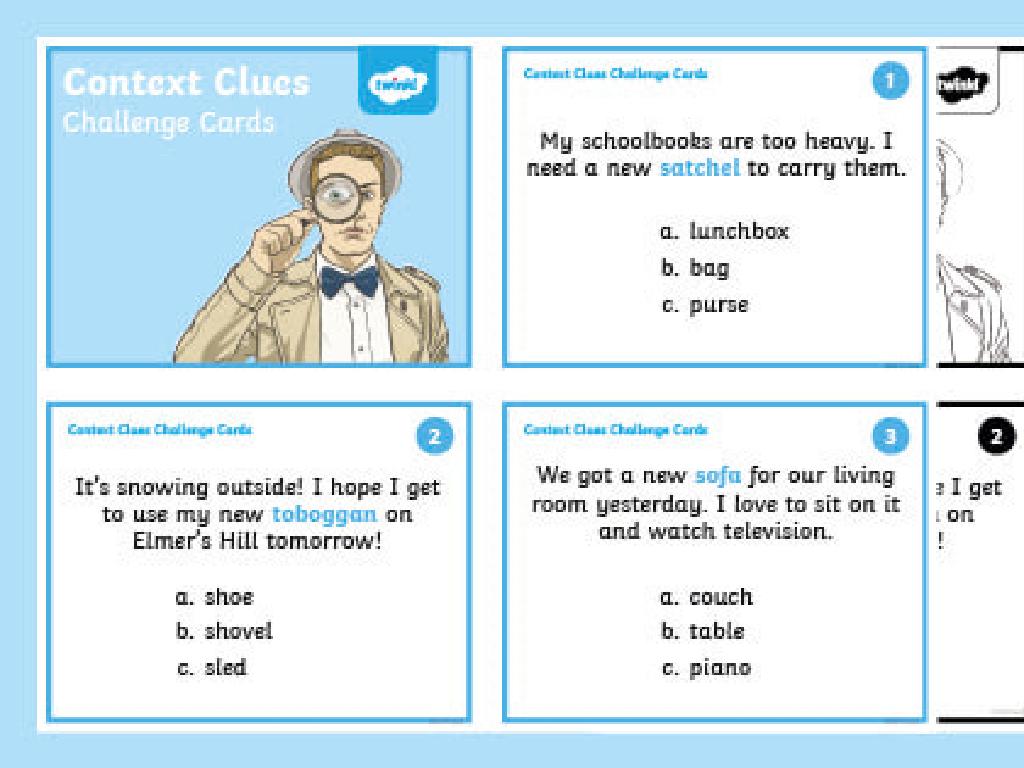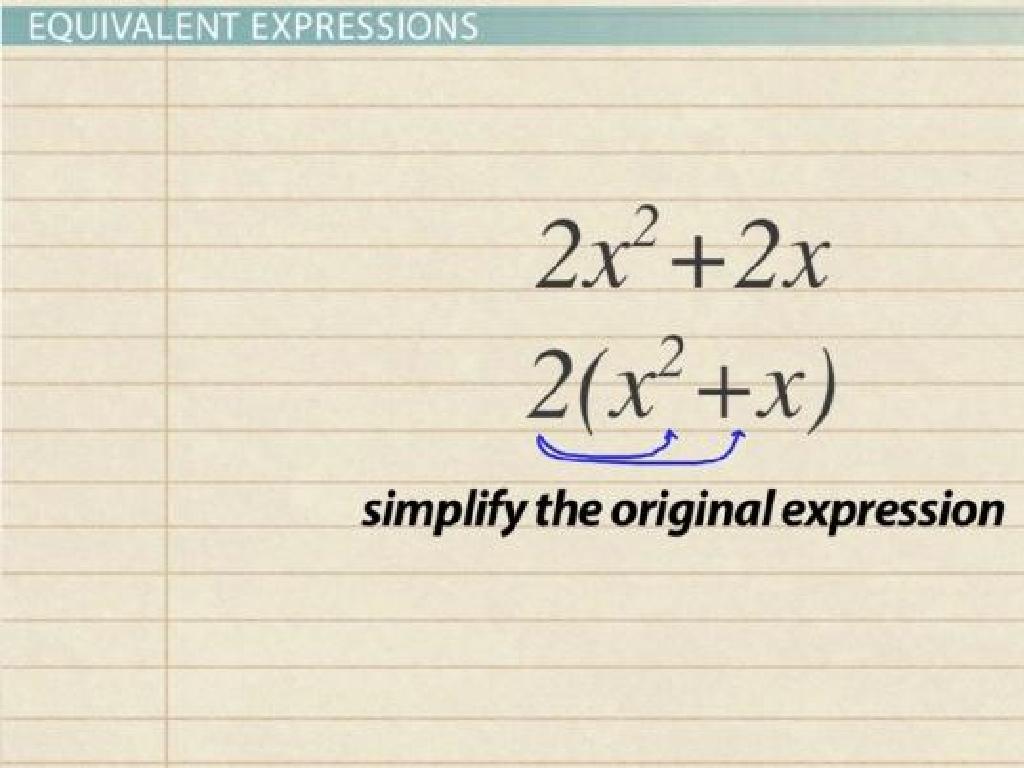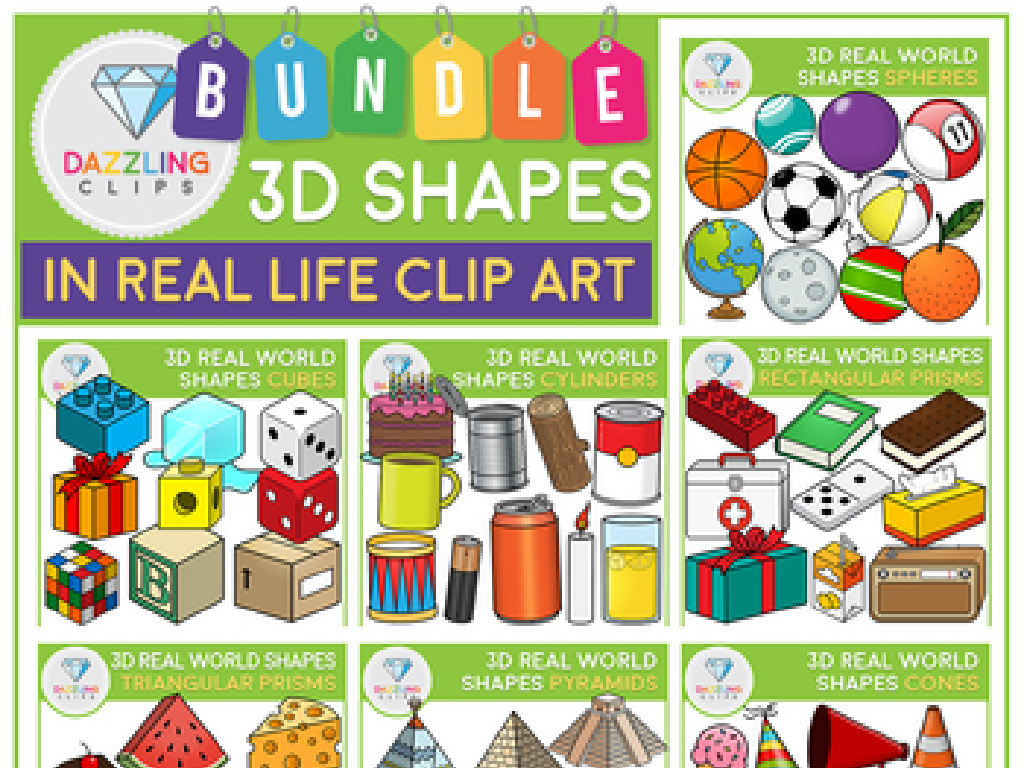Determine The Meaning Of Words Using Synonyms In Context
Subject: Language arts
Grade: Fifth grade
Topic: Context Clues
Please LOG IN to download the presentation. Access is available to registered users only.
View More Content
Today’s Adventure: Synonyms in Context
– Exploring Context Clues
– Context clues are hints to unknown words.
– Synonyms Unveil Meanings
– Synonyms are words with similar meanings.
– Practice with Synonyms
– Find synonyms in sentences for clues.
– Apply Synonyms in Reading
– Use synonyms to grasp new vocabulary.
|
This slide introduces the concept of using synonyms as context clues to determine the meaning of unfamiliar words. Begin by explaining that context clues are hints found within a sentence or passage that can help decipher the meaning of an unknown word. Emphasize that synonyms, words with similar meanings, are powerful context clues. Provide examples of sentences where a synonym is used to give insight into the meaning of a highlighted word. Encourage students to practice this skill by identifying synonyms in sample sentences and using them to understand new vocabulary. This will help students become more independent readers and enhance their comprehension skills.
Understanding Synonyms
– Define: What is a synonym?
– A synonym is a word that means almost the same as another word.
– Synonyms have similar meanings
– Words that can be used interchangeably without changing the sentence’s meaning.
– Examples: happy – joyful
– ‘Happy’ can also be expressed as ‘joyful’.
– More examples: sad – unhappy, fast – quick
– ‘Sad’ can be ‘unhappy’, and ‘fast’ can be ‘quick’.
|
This slide introduces the concept of synonyms to the students. Start by explaining that synonyms are words that have similar or the same meanings and can be used interchangeably in sentences. Provide clear examples to illustrate the point, such as ‘happy’ and ‘joyful’, which mean the same thing. Encourage students to think of synonyms as a way to expand their vocabulary and make their writing more interesting. Ask them to come up with their own examples of synonyms and use them in sentences to demonstrate their understanding.
Using Synonyms as Context Clues
– Authors use synonyms as clues
– Synonyms help understand new words
– Like ‘big’ is a synonym for ‘large’, helping us understand the context
– Use known synonyms to infer meaning
– If you know ‘happy’, you can guess ‘joyful’ means feeling good
– Practice with examples
– Find synonyms in sentences and guess the meaning of new words
|
This slide introduces the concept of using synonyms as context clues, a strategy that helps students decipher unfamiliar vocabulary in their reading. Explain that authors often include synonyms to make their writing more interesting and to help readers understand new or difficult words. Encourage students to use words they already know to find the meaning of new words. Provide examples where a synonym in the sentence gives a clue to the meaning of an unfamiliar word. For instance, in the sentence ‘The ancient ruins were colossal, so much bigger than she expected,’ the word ‘colossal’ can be inferred to mean ‘very big’ because it is a synonym of ‘bigger.’ Practice this skill by reading passages and identifying synonyms that give context to new vocabulary.
Using Synonyms to Understand Words
– Read a literature passage
– Highlight unfamiliar words
– Find synonyms as context clues
– Synonyms in the passage help us guess word meanings
– Discuss the meanings together
– Share and compare our interpretations
|
This slide is aimed at helping students use synonyms within a text to determine the meaning of unfamiliar words. Start by reading a selected passage together as a class. Encourage students to highlight words they don’t know. Guide them to use synonyms found in the surrounding context to infer the meanings of these highlighted words. After identifying the synonyms and discussing them, have students share their interpretations of the word meanings. This exercise will enhance their vocabulary and reading comprehension skills, emphasizing the importance of context in understanding literature.
Practice Time: Synonyms in Context
– Sentences with new words
– Find synonyms in sentences
– Look for words that have similar meanings
– Determine meanings of new words
– Use the synonym to figure out the unknown word
– Share your answers with the class
|
This slide is for a classroom activity where students will practice using context clues to determine the meaning of new words. Provide sentences that contain unfamiliar words along with synonyms that give hints to their meanings. Encourage students to use the synonyms as a way to infer what the new words might mean. After they have made their guesses, they should be prepared to share their answers and discuss as a class. This exercise will help students enhance their vocabulary and improve their ability to understand texts by looking at context. For the teacher: Prepare sentences with clear synonyms and be ready to guide students through the process of deducing meanings. Have a list of additional sentences ready for students who finish early or for further practice.
Group Activity: Synonym Search
– Form small groups for the activity
– Pick a favorite book or story
– Find synonyms within the text
– Look for words with similar meanings
– Discuss how synonyms aid comprehension
– Share examples and explain the context
|
This group activity is designed to enhance students’ understanding of synonyms and how they contribute to the comprehension of a text. Divide the class into small groups and have each group select a book or story that they enjoy. Instruct them to search for words that have similar meanings (synonyms) and note them down. Encourage discussion within the groups about how these synonyms help clarify or enhance the meaning of the story. After the activity, each group will share their findings with the class, explaining how the context around the synonym helped them understand the word and the story better. This exercise will help students recognize the importance of context clues and improve their vocabulary. Provide guidance on how to identify synonyms and facilitate the sharing session to ensure each group participates.
Class Activity: Crafting Sentences with Synonyms
– Become the author: write new sentences
– Use new vocabulary in your sentences
– Pick words you’ve recently learned
– Include synonyms as context clues
– Place a synonym nearby to give a hint
– Get ready to share with the class
|
This activity is designed to reinforce the students’ understanding of using synonyms as context clues to determine the meaning of new words. Encourage students to think creatively and come up with sentences that naturally incorporate the new vocabulary they’ve learned. Remind them to include synonyms that can help others guess the meaning of the new words. After writing, students will engage in a sharing session where they read their sentences aloud, and classmates try to infer the meanings. This will not only help with vocabulary building but also with public speaking and listening skills. Possible activities for different students could include creating sentences based on different themes, such as nature, school, or family, or focusing on different parts of speech, like verbs or adjectives.
Reflection on Synonyms and Context Clues
– Synonyms enhance vocabulary
– Synonyms are words with similar meanings that can replace each other.
– Context clues aid comprehension
– Clues in sentences help us figure out unknown words.
– Applying skills to reading and writing
– Understanding synonyms and context improves our literacy skills.
– Think of personal synonym examples
– Recall times when a synonym clarified a word you didn’t know.
|
In this concluding slide, we reflect on the importance of understanding synonyms and using context clues to determine the meaning of words. Recognizing synonyms can greatly expand a student’s vocabulary and allow for more precise expression in both oral and written communication. Context clues are essential for reading comprehension, as they help students infer the meaning of unfamiliar words without consulting a dictionary. Encourage students to think about how these strategies will assist them in their daily reading and writing tasks. Ask them to provide examples from their own experiences where understanding synonyms has helped them grasp the meaning of new words. This reflection will help solidify their learning and recognize the practical applications of these skills.






